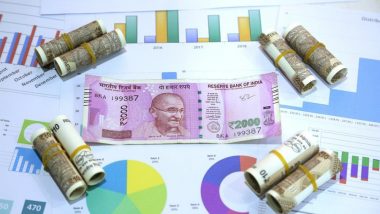New Delhi, February 25: The Indian economy is expected to clock a growth of 13.7 per cent in FY'22, registering a strong rebound from a 7 per cent contraction this fiscal, on the back of normalisation of activity and growing confidence in the market with the rollout of COVID-19 vaccine, Moody's Investors Service said on Thursday.
Moody's had in November last year projected Indian economy to contract 10.6 per cent in the current fiscal and return to growth of 10.8 per cent in 2021-22 fiscal.
"Our expectations in current fiscal year ending March 2021 is for a contraction of 7 per cent significant improvement from our ... (earlier) forecast of contraction of over 10 per cent. We try to incorporate some of the unexpected pickup in activity that we have seen recently. Economic Growth Projections of India, China Give Hope to South African Economy, Says Finance Minister Tito Mboweni.
"For the year following that we expect a rebound of 13.7 per cent that reflects largely normalisation of activity, a pronounced base effect. Recovery of activity reinforced by some degree of rollout of vaccine, and growing confidence in market that things are getting more back to normal," Moody's Investors Service Associate Managing Director (Sovereign Risk) Gene Fang said in an online conference organised by Moody's and its India affiliate ICRA on India Credit Outlook 2021.
Fang said reform implementation remains a challenge in India, and expressed uncertainty over revenue generation through CPSE privatisation announced in the Budget saying such "one-off monetisation policies are less durable in terms of supporting fiscal health for long term".
Stating that recession in India has ended, ICRA Principal Economist Aditi Nayar said Indian economy could clock a 0.3 per cent growth in the October-December quarter of the current fiscal.
Indian economy contracted for two consecutive quarters of June and September this fiscal, thereby entering into recession. Contraction was 23.9 per cent and 7.5 per cent respectively. ICRA expects Indian economy to contract 7 per cent in current fiscal and growth to rebound to 10.5 per cent in the next fiscal beginning April 1.
Nayar said there could be upside to growth in FY'22 if government's capital expenditure increases, budget announcements are implemented and vaccination drives are carried out.
The Economic Survey had projected Indian economy to contract 7.7 per cent in current fiscal and growth to rebound to 11 per cent next fiscal. Recovery of activity reinforced by some degree of rollout of vaccines, and growing confidence in the market that things are getting back to normal would push growth, he added.
In the medium term for fiscal years ending March 2023 and 2024, Moody's expects growth to come in at 6.2 per cent, reflecting further normalisation in activity for these two years.
"The potential growth in India is going to be around 6.5 per cent and we would not see more prominent scarring as a result of pandemic," Fang added.
Moody's had in June last year downgraded India's sovereign rating to 'Baa3', which is the lowest investment grade, with a negative outlook saying there will be challenges in implementation of policies to mitigate risks of a sustained period of low growth and deteriorating fiscal position.
Fang said Moody's has some concern about policy implementation going forward and the degree to which the government can execute on some of the growth supportive measures, like capex spending, is going to have an impact on growth forecast. Indian Economy May Contract 25% in Current Fiscal Year, Says Economist Arun Kumar.
"Moreover, we would say agriculture reforms that the government announced last year will go a long way in addressing some of the structural challenges that we see in the broader economy but we are seeing that these types of broad ranging reforms are difficult to implement in the environment like India. We still are of view that implementation remains the challenge," he added.
The government has budgeted to mop up Rs 1.75 lakh crore through Central Public Sector Enterprises (CPSE) disinvestment in the next fiscal, up from estimated Rs 32,000 crore to be mopped up this fiscal. Much of the disinvestment proceeds would come from CPSE privatisation.
On whether the target is achievable, Fang said "I don't think we are able to have a very clear view on those specific projects from the sovereign perspective... In general, this type of one-off monetisation policies are less durable in terms of supporting fiscal health for long term... We probably have the most uncertainty around the executability and realisability of these monetisation projects.













 Quickly
Quickly


